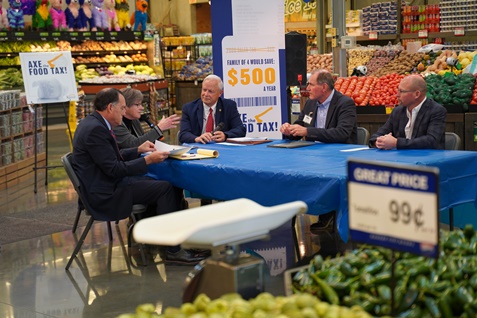Deal costs state $90M annually — far less than original $500M wish list
by Tim Carpenter, Kansas Reflector
Topeka — Rep. Adam Smith emphasized the tax reform bill negotiated by a half-dozen House and Senate members started as an extravagant wish list that would have drained off more than $500 million in annual state revenue.
“We did a lot in committee trying to pare this down,” said Rep. Smith, the Weskan Republican and chairman of the House Taxation Committee. “When all the requests and considerations were put in there, it was close to — I’m going to estimate it — close to $500 million to $600 million. We were trying to be fiscally responsible and look at the overall picture.”
Still, the bundle of tax policy changes the House-Senate conference committee wrapped into House Bill 2239 sent a chill down the spine of Rep. Jim Gartner, D-Topeka. He’s not keen to craft a mega-bill drawn from an assortment of other bills, because the tactic usually meant Republicans were trying to force reluctant legislators to hold their noses and vote for a deal.
“Do you know how many bills are in this one bill?” Rep. Gartner asked.
“Do you really want to know?” said Rep. Smith, a bit sheepish about answering. “There are provisions, if I counted it right, of 29 different bills.”
“That has to be a record for a tax bill,” Rep. Gartner said.
The House, with Reps. Gartner and Smith in the affirmative, voted 103-10 to adopt the compromise bill cleaving $90 million a year from tax revenue to the state. A significant chunk of that cut was aimed at property taxpayers assessed 20 mills for support of K-12 public education. Under current law, the first $20,000 of valuation is exempt from the assessment. The bill would double that exemption to $40,000, which would result in taxpayers retaining an estimated $42 million per year.
More work to do
The Senate was more appreciative of the deal and approved the bill 39-0. That sent it last week to Gov. Laura Kelly, who could sign it, veto it or let it become law after 10 days without her signature. A veto could be considered when the Legislature returns April 25.
Sen. Caryn Tyson, a Parker Republican campaigning for the GOP nomination for state treasurer, said she was disappointed the Legislature didn’t take up other tax bills waiting in the wings.
That to-do list includes House Bill 2597 offering compensation to certain businesses forced to close or modify operations early in the COVID-19 pandemic. Another measure, House Bill 2237, contains tax credits to spur rural housing construction in counties with less than 75,000 residents.
“We have had a surplus of over $3 billion and we are not making a priority to pass this tax money back to the Kansas taxpayers,” said Sen. Tyson, who chairs the Senate Assessment and Taxation Committee. “I am extremely disappointed. Politics should not get in the way of providing for Kansas citizens, especially in this economy. I pray we will make Kansas taxpayers a priority.”
The tax reform idea capturing attention of average Kansans was deposited in House Bill 2106, which also wasn’t acted upon before the Legislature adjourned for a three-week break. The bill would phase out the state’s 6.5% sales tax on groceries over a three-year period. The state rate would drop to 4% on Jan. 1, 2% on Jan. 1, 2024, and zero on Jan. 1, 2025. City and county sales tax rates wouldn’t be changed.
Or, just repeal it
Gov. Kelly, a Democrat, has continued to campaign for elimination of the state’s 6.5% sales tax on groceries. It’s been at that level since 2015 when former Republican Gov. Sam Brownback signed legislation raising the state sales tax from 6.15% to 6.5% to bolster the state treasury after aggressive income tax cuts threw the state into a financial quagmire.
Brownback’s income tax cuts were mostly repealed in 2017, but the state’s tax on food remains among the nation’s highest.
In a statement, Gov. Kelly said the state could afford to delete the state’s portion of sales tax on groceries because state government tax receipts “continued their positive pattern.” In March, state revenue from individual and corporate income taxes, retail sales taxes and other sources totaled $680 million. That was $80 million or 13% more than the projection for March based on estimates of fiscal analysts in November.
“These collection numbers demonstrate the ability to axe the food tax, eliminating the state’s sales tax on groceries on July 1, which provides immediate relief to all Kansans,” said Gov. Kelly, who is seeking re-election. “Due to the state’s sales tax on groceries and pandemic-induced inflation, Kansans continue to pay some of the highest grocery prices in the nation.”
Attorney General Derek Schmidt, a Republican campaigning for the gubernatorial nomination, also embraced exclusion of groceries from the state sales tax. The pending food sales tax legislation and proposals by Gov. Kelly and Schmidt wouldn’t alter city or county sales tax rates.
Kansas Reflector stories, www.kansasreflector.com, may be republished online or in print under Creative Commons license CC BY-NC-ND 4.0.
See more at https://kansasreflector.com/2022/04/05/kansas-tax-reform-bundle-sent-kelly-amassed-from-shards-of-29-different-bills/.

